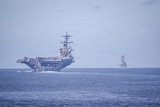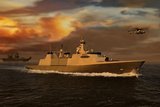OPV utility will have future relevance
Offshore patrol vessels (OPVs) will be able to play a number of roles in future operations by services like the UK Royal Navy and, together with corvette-sized vessels, offer a faster way to regenerate capability for shrinking fleets.
At present a Royal Navy Batch 1 River-class OPV, HMS Mersey, is deployed to the North Atlantic on counter drug smuggling and defence engagement duties. The vessel recently assisted the Royal Canadian Navy and US Coast Guard in seizing a large shipment of narcotics near Nicaragua.
Meanwhile HMS Clyde, a modified Batch 1 River-class, is forward deployed to the Falkland
Already have an account? Log in
Want to keep reading this article?
More from Naval Warfare
-
![UK’s Fleet Solid Support ship programme deemed on track despite steel supply concerns]()
UK’s Fleet Solid Support ship programme deemed on track despite steel supply concerns
Shipbuilders are saying the programme is going ahead on time as the government estimates 7.7 million tonnes of steel are needed for 2026 infrastructure projects.
-
![As Indonesia doubles up its order, who else is looking at the Arrowhead 140 frigate design?]()
As Indonesia doubles up its order, who else is looking at the Arrowhead 140 frigate design?
The adaptable design of Babcock’s Arrowhead 140 frigate, already selected by the UK Royal Navy and Poland, has led to more orders from Indonesia while other countries continue to weigh it up.
-
![US Navy to invest more than $700 million in laser-related R&D efforts in FY2026]()
US Navy to invest more than $700 million in laser-related R&D efforts in FY2026
The US Navy’s acceleration of its laser weapon development initiatives reflects a decisive shift towards ultimately having a “laser on every ship” across tomorrow’s surface fleet.





















